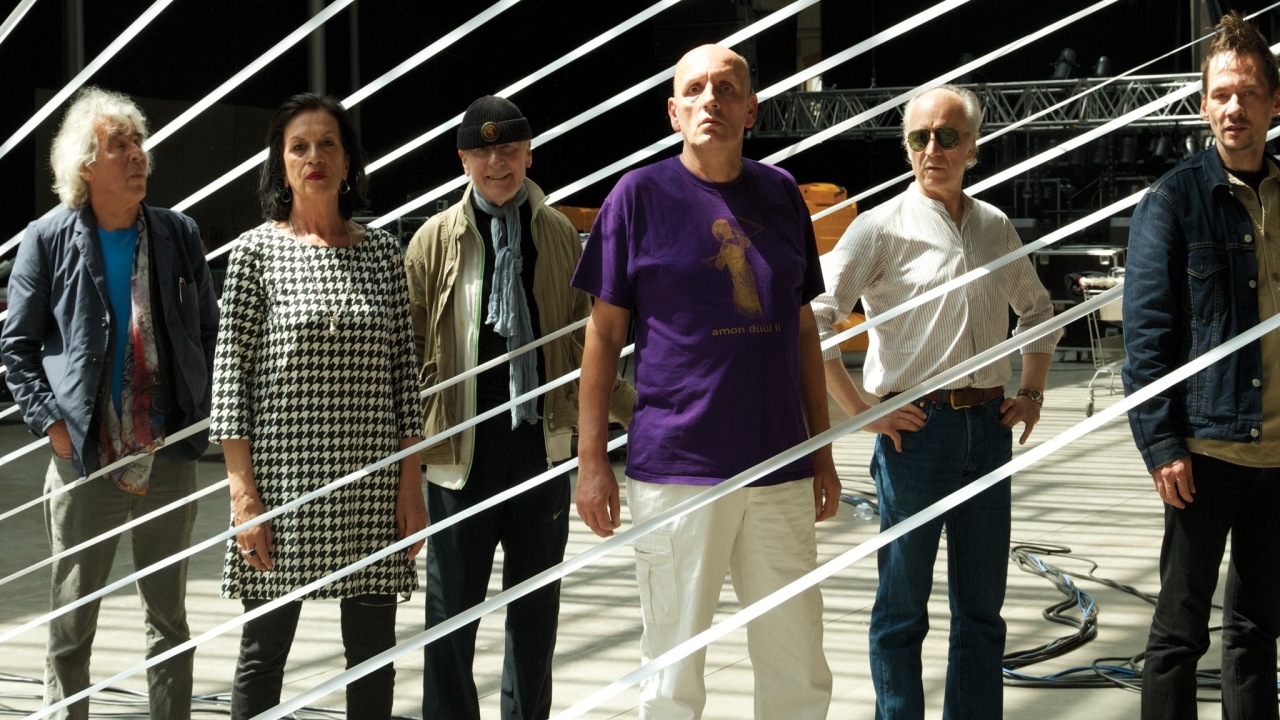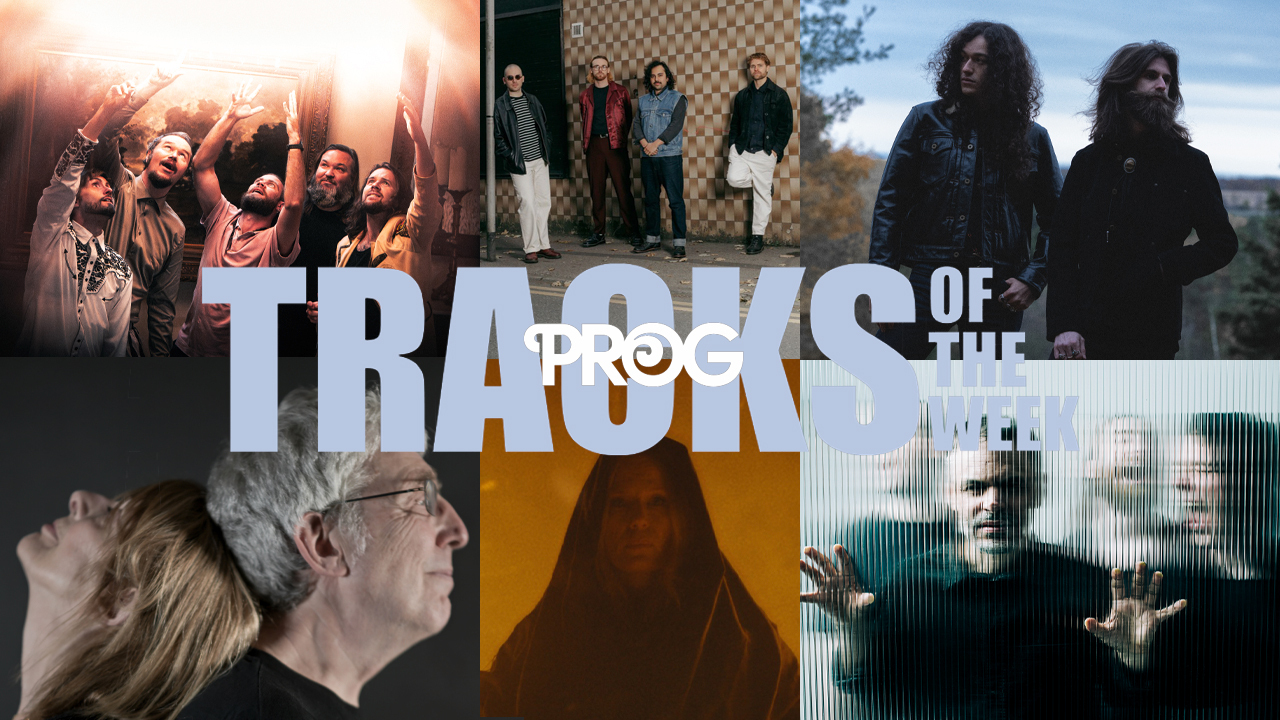A Sting In The Tail
After 30 years away from music, the 2009 digital release of Bee As Such by Amon Düül II was a surprising yet welcome return for one of the world’s most experimental and innovative bands.

Select the newsletters you’d like to receive. Then, add your email to sign up.
You are now subscribed
Your newsletter sign-up was successful
Want to add more newsletters?

Every Friday
Louder
Louder’s weekly newsletter is jam-packed with the team’s personal highlights from the last seven days, including features, breaking news, reviews and tons of juicy exclusives from the world of alternative music.

Every Friday
Classic Rock
The Classic Rock newsletter is an essential read for the discerning rock fan. Every week we bring you the news, reviews and the very best features and interviews from our extensive archive. Written by rock fans for rock fans.

Every Friday
Metal Hammer
For the last four decades Metal Hammer has been the world’s greatest metal magazine. Created by metalheads for metalheads, ‘Hammer takes you behind the scenes, closer to the action, and nearer to the bands that you love the most.

Every Friday
Prog
The Prog newsletter brings you the very best of Prog Magazine and our website, every Friday. We'll deliver you the very latest news from the Prog universe, informative features and archive material from Prog’s impressive vault.
You could call it an event. In 2009, Amon Düül II released Bee As Such, their first studio album in nearly 30 years.
The band’s website was keen to stress that this was no idle concession to nostalgia. Instead, it promised “no ‘kraut’, no 70s, but the music of the new millennium”. Guitarist and founder member John Weinzierl was also at pains to make clear their modus operandi: “Avoiding industry music, heading for new frontiers.”
Bold words. But if any band have spent their time doggedly pursuing their own vision, scornful of record labels and corporate protocol, it’s Amon Düül II. Beholden to no one but themselves, this German troupe of free-thinking radicals have more often than not done it the hard way, at odds with authority and the post-war society they sprang from. There have been fisticuffs, feuds and court battles. “They tried to kill us but they couldn’t,” Weinzierl tells Prog today. “So we’re still here. We had this vision to die in our boots with a guitar around our necks.”
Amon Düül II were arguably the freakiest of the new bands that emerged from Germany in the late 60s and early 70s: more experimental than Can, messier than Kraftwerk, wilder than Popol Vuh, louder than Faust. Mighty albums like Phallus Dei, Tanz Der Lemminge and Yeti contained some of the strangest, most deranged prog-psych you were ever likely to hear. There were thunderous tribal rhythms, yelping vocals, improvised guitar noise and extended jams. Of all their contemporaries, Amon Düül II were perhaps closer to the original vision of what this loose scene represented. This wasn’t just music, this was a way of living. You might even say that they weren’t even a band at all, more a social experiment.
“We started as a commune,” explains Weinzierl, “so it was not about the band. Most of the group were students and we realised that this was a creative way of living. There were also financial reasons, because it was much cheaper that way. Everyone was making music anyway, so that side of it just developed. We never thought of making a career out of it. Our first gigs were in universities, at teach-ins and love-ins, with all the revolutionary aspects. Above all, music is great communication.”
It’s impossible to tell the story of Amon Düül II without placing them in the wider context of the times. When they formed in 1967, in a commune south-west of Munich, their homeland was still recovering from the aftermath of war. There were ruinous examples of once-great monuments everywhere, while many ex-Nazi Party members continued to be employed in positions of power. Amon Düül II set about trying to embrace a new society, built on the principle of freedom for everybody.
“It was a great big youth revolution,” says Weinzierl. “It was different in every country – in America it was all to do with Vietnam, it was students in Prague, and Nazis in Germany. Because when we grew up after the war, you couldn’t get rid of all the Nazis, all the judges and teachers. At school it was just terror, so we rebelled against it.”
Sign up below to get the latest from Prog, plus exclusive special offers, direct to your inbox!
The freedom they craved was reflected in their approach to music. Centred around a core of Weinzierl, Chris Karrer (guitar/vocals), Falk Rogner (organ), Renate Knaup (vocals) and Peter Leopold (drums), the fluid Amon Düül II collective sought to distance themselves from most of their Western counterparts.
“As a guitarist in the early days,” Weinzierl explains, “I was not supposed to listen to Clapton, because it was called ‘Mickey Mouse music’. Of course, we had to listen to it secretly. But the poppish stuff and three-minute songs were not our thing. Unlike England or America, Germans don’t have a blues tradition. Instead we have this classical tradition, which is why our songs are like suites or a fugue. We developed these long forms when we started playing in the commune.”
Signed to Liberty after forging a reputation in the underground clubs of Munich and beyond, Amon Düül II’s debut, Phallus Dei, landed in 1969. The name alone (translated from Latin as ‘God’s Penis’) was a provocative signal of intent. Meanwhile, the album was dominated by the extraordinary title track, a roaring 20-minute abstraction of blitzoid percussion and heavy jams.
1970’s follow-up, Yeti, offered more of the same over its four sides of vinyl. Only this time there were also majestic acid-rock songs (Archangel Thunderbird) alongside bouts of almost folky introspection (Cerberus) and a spacey rumination (Sandoz In The Rain) to out-weird Hawkwind.
“We were determined that we weren’t going to go into this whole pop thing,” Weinzierl says. “No love’n’Haight and shit. The music was all to do with complication. But it had less to do with LSD than people think. We never were an acid band. Of course acid had a real impact on our development – it was a big flash and really shook us to the bone – but it was just a side influence, not the main one. We were listening to Hapshash And The Coloured Coat, Velvet Underground and Pink Floyd before making Phallus Dei. I think The Piper At The Gates Of Dawn had a similar attitude.
“Another factor was that we were not masters of our instruments, so sounds appeared that we didn’t expect. You couldn’t buy good guitars in the shops in Germany. We got all the leftovers and rubbish from America and England. But we realised that we could take advantage of that, because we were coming up with new forms.”
The cover of Yeti featured commune member Wolfgang Krischke as a gothic grim reaper, wearing a black cloak and wielding an enormous scythe. It was a powerful image. As if signalling the death of all that was repellent in post-war German culture, it remains Amon Düül II’s logo to this day. It also serves as a memorial to Krischke himself, who had died of hypothermia the previous winter.
“He fell in love with this girl,” recalls Weinzierl, “but her parents didn’t like him because he had long hair, which was forbidden in Germany then. You’d get beaten up in the street. If you went to a hotel looking like that, you’d get a fist in your face. Wolfgang was so sad and lovesick because he couldn’t get together with this lady, so he took an LSD trip and walked into the forest. His body was found later and animals had started eating him. But he became the logo. I mean, what an image. Isn’t it fantastic?”
On the back of those first two albums, the release of Tanz Der Lemminge (1971) and Wolf City (’72) afforded Amon Düül II more traction in wider Europe. When they first visited the UK, Weinzierl remembers it “absolutely blowing my mind. We were fans of The Who and The Beatles and all these English bands. Then when we played in London, I looked into the audience and it was full of people like Pete Townshend. I was stunned.”
Around the same time, the British music press coined the term ‘krautrock’ to describe the new wave of progressive-minded bands seeping in from Germany. Reductive at best, it’s a word that still makes Weinzierl bristle. “I hate the term, because we’re not krautrock. We came to England as the first German band since the war, then many others came after us. So one day some guy from the NME or Melody Maker came up with the expression. I put it this way – ‘krautrock’ is actually German musicians trying to play like English or American musicians. But Amon Düül are psychedelic underground. It’s something I fight against all the time.”
Things began to unravel for Amon Düül II in the mid-70s. The commune fell apart, personal resentments set in and people drifted away. There were a number of line‑up changes, record company wrangles and a series of increasingly flat albums with producers who saw fit to streamline their sound into something conventional. The band made little or no money.
By 1981 they’d disbanded altogether. The ensuing decades saw half-hearted reunion attempts, other groups laying claim to the Amon Düül II moniker and courtroom tussles to regain rights to the name. All of which made the sudden arrival of 2009’s _Bee As Such _album, albeit as a download only, both unexpected and welcome – especially when it boasted founder members Weinzierl, Karrer and Knaup (now Knaup-Kroetenschwanz) at the helm.
They’ve now finally seceded to fans’ wishes and released the album in a physical format as Düülirium. It’s perhaps unfair to compare the record to prime classics like Yeti or Wolf City, but it’s still packed with the voyaging fervour of their original work and enough ambition to make lesser bands blush.
Weinzierl promises new Amon Düül II music too, as well as a tour of America and, hopefully, the UK. They may be bruised, but they are most certainly unbowed.
“We old bastards are tougher,” he contends. “We’re the most cheated band in the world. I used to think record companies were the temples of music, until I found out there’s just some jerk behind it who wants money. These people can steal songs but they can’t write new ones, like we can. Now we’re alive and kicking and spirited. And there’s more to come.”
Düülirium is out now on Cleopatra Records. See www.amonduul.de for more information.
Freelance writer for Classic Rock since 2008, and sister title Prog since its inception in 2009. Regular contributor to Uncut magazine for over 20 years. Other clients include Word magazine, Record Collector, The Guardian, Sunday Times, The Telegraph and When Saturday Comes. Alongside Marc Riley, co-presenter of long-running A-Z Of David Bowie podcast. Also appears twice a week on Riley’s BBC6 radio show, rifling through old copies of the NME and Melody Maker in the Parallel Universe slot. Designed Aston Villa’s kit during a previous life as a sportswear designer. Geezer Butler told him he loved the all-black away strip.

